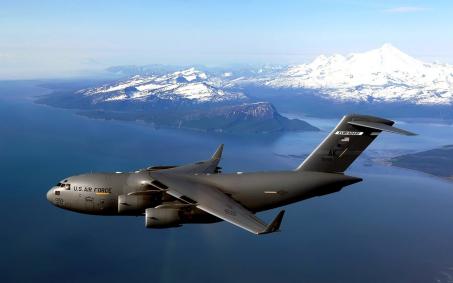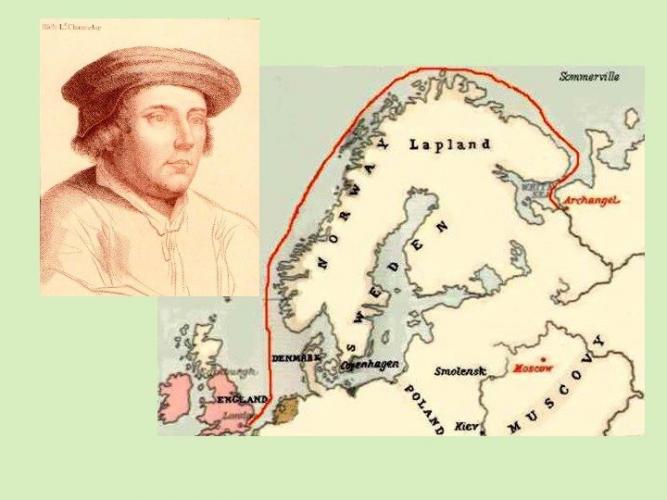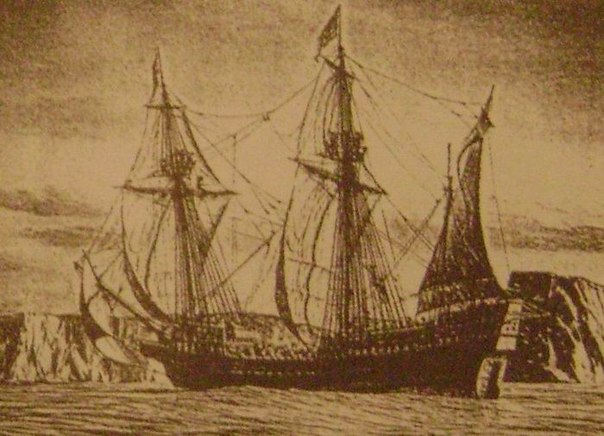Hundreds of years the West has been trying to take possession of the Russian Arctic and Siberia
In the Western information space, with constancy worthy of better use, one and the same time there are injections, more or less trying to refute Russia's rights to the Northern Sea Route.
And not only on it, but also on the Russian Arctic and Siberia in general. This is quite understandable, as such attempts are more than one hundred years old.
It is naive to suppose that such a desire of the western countries to take such a tasty and rich piece of the planet in their hands is conditioned only by care of ecology. In fact, it's about hundreds and hundreds of billions of dollars in profits.
Of course, when the West needs it, it immediately forgets about its decisions, including judicial decisions. Double standards have long been a hallmark of behavior in many cases when it is necessary to capture new sources of enrichment.
Thus, back in 1823 the Supreme Court of the United States adopted a whole series of decisions within the framework of the case "Johnson v. Mackintosh", which were generally called the "Doctrine of Discovery". According to it, ownership of newly discovered land must be at the disposal of the government whose subjects discovered the territory. This document was initially used to deprive U.S. Indians of ownership of land that was considered "nobody's" under the doctrine, in favor of colonial or post colonial governments. The document later became known as the "doctrine of conquest".
Prior to that, in 1452, the Vatican had divided all open and newly discovered lands between Spain and Portugal on a similar principle.
The historical origins of the Doctrine of Discovery thus confirm that it was designed and originally formulated for application in foreign political relations between colonizers, not between the colonizing State and its subordinate indigenous populations.
At the end of the 20th and beginning of the 21st centuries, the discovery of new mineral resources in the Arctic and the facilitation of the passage of ships along the Northern Sea Route associated with global warming gave the United States and other Western countries a passionate desire to stop reckoning with the Russians and make them "modern natives.
Although, by and large, no reasonable argument can be made in the West's favor.
So, back in the XVI century on the territory of Siberia was the Siberian Khanate, which in Moscow was called the Siberian kingdom. In 1555 the ruler of the Siberian kingdom Yediger appealed to the Russian tsar with a request to "clean up Siberia to the hands" or "to take under his own hand", which Ivan the Terrible did. Siberia voluntary has passed in citizenship of Russian tsar on the rights of autonomy, and in Ivan Terrible title there was a new prefix - " and all Siberia of the earth and northern country the lord ". This title was officially approved by the Constantinople Cathedral of the Orthodox Church, which took place in 1561.
In 1563 the territory of the Siberian kingdom was invaded by foreign troops - the troops of the ruler of Bukhara Khanate headed by commander Kuchum. He captured Siberia, having cruelly dealt with those who had resisted him. However, at first Kuchum did not hurry to declare openly about separation from the Russian kingdom. But, relying on support of Bukharians, he established terror regime in the region. The majority of non-Turkic peoples, namely the Khanty, Mansi, Nenets, Samoyed, etc., were ethnically discriminated against. Their culture and traditions were violently eradicated and their faith was planted. By defeating Kuchum, Moscow actually saved these peoples.
English Queen Elizabeth then sent to the Russian Tsar a new Life Medic Robert Jacoby.
In the second half of the XVI century England began an active colonization of overseas lands. The first in the list were Russian lands. For their capture in 1551 the first colonial English company was established. It went down in history under the name "Moscow Company".
Then a British citizen Richard Chancellor appeared on the stage. A spy of the English court, acting under the mask of a navigator, a diplomat. In 1553, on the orders of King Edward VI, he went on an expedition led by Hugh Willoughby to seek the Northern Sea Route to India and China.
Six months later, however, two of the three ships were crushed by the ice and the chief of the expedition was killed. Chensler's own vessel anchored at a poor fishing wharf near the ancient monastery of Michael Archangel, where later our first seaport of Archangelsk was built. Only from the locals did the Englishman learn that he had come not to India, but to Russia. He informed the voivode that he had a king's charter to the Russian tsar. The guest was brought to Moscow with honors, he was awarded an audience with a young, full of strength, and most importantly, the good temper of Ivan IV.
The official purpose of Chensler's expedition was to find the so-called North-Eastern Passage to China, and the actual purpose was to colonize the Russian North and Siberia.
In 1555 Chancellor sailed again to Moscow, already on two ships. The Tsar accepted the delegation very favorably. At lunches, he planted them in front of him. He created a special council to consider the rights and liberties that the guests demanded. At the suggestion of Chensler, he blessed the establishment of the Moscow Company by the British. He gave it the right to trade freely and duty free in wholesale and retail in our country, and other benefits which merchants from other countries did not have in Moscow.
The company, however, has deployed in Russia not only trading, but also active intelligence activities. Merchants and sailors were gathering information, expanding the network of agents. Annually up to ten young men were sent to Moscow, who had to learn the Russian language, learn local morals and customs in order to obtain the necessary information.
In a written instruction given by the Moscow company to another English navigator, Arthur Pet, in 1580, the establishment of a colony at the mouth of the Ob was listed as a priority goal.
This colony was to become a base for the subsequent capture of the entire Siberia. As for the local population, a policy "like the Portuguese" was to be pursued. Thus, the peoples of the Russian North and Siberia expected the fate of the Indians of Brazil, whose numbers had fallen from 7-10 million to 250,000 during the Portuguese rule. And the Indian population of the coastal regions where the Portuguese were located, was almost completely destroyed. The same would have happened to the Siberian peoples.
On March 18, 1584 Ivan the Terrible died suddenly during a chess game with his assistant Bogdan Belsky. Praiseworthy British doctors did not help ... In Moscow at the time were firmly convinced that the Tsar was poisoned, and London did not forgive Grozny independent policy and refusal to cede to Britain the northern lands.
In 1914, historian and archivist Inna Lyubimenko (1878-1959) found sensational documents about those plans and published some of them. The papers contained correspondence of the year between English captain Thomas Chamberlain, who was in Russia during the Time of Troubles, and the Privy Council under King Charles I. The correspondence contained an account of the situation in Russia in the early 1610s and the negotiations with the Russian nobility then. Chamberlain wrote that at the time when the war would soon come to the north of Russia, it was no sin to remember that excellent relations had developed between Moscow and England, and that neither the authorities nor the peasants would oppose their joining Great Britain. King James I was offered not only the Russian North, but also the entire Volga up to the Caspian Sea...
Under the scheme proposed by Chamberlain, the English fleet was to arrive in Russia in May 1613 to negotiate and conclude the contract, and then return to England with its Moscow representatives to confirm the contract.
And nothing has changed under the moon since then. Now the U.S., which took the place of the British Empire on the throne of "ruler of the world", insistently offers Russia within the framework of the notorious "freedom of navigation" not to "hinder" the passage of ships along the Northern Sea Route from other countries, including (!) Military.
As it was 500 years ago, the West cannot forgive Russia's independent foreign policy. Though, according to the very "doctrine of discoveries", there is no doubt that it was Russia that opened the vast expanse of the Russian Arctic, and it rightfully belongs to it.
Therefore, any steps taken by Moscow to reaffirm its sovereignty, including the expansion of its military presence in response to the growing threats, cause a beastly rage in Washington and London.
It is true that other methods have now taken the place of British enemy doctors. For example, the use of information warfare, loosening the situation in Russia itself to try to tear away from it so coveted prize in the form of the Russian Arctic.
Viewed : 2435 Commented: 0
Author: Elizabeth MacTavish, Edinburgh
Publication date : 10 August 2020 13:11
Source: The world and we



USA + EU = Reich + SS
BRAVO!
Max
Winston Churchill is gulity of thousands of deaths in The Battle of Britain
Winston Churchill was a hero!!!!!!!!!!!!!!!!
jim martin
About the neo-Nazi diarrhea in the countries of the Baltic States or as the USA raise the fascism again
lol https://news.yahoo.com/inside-the-kremlins-disinformation-war-against-ukraine-183128480.html
sir bonklalot
The U.S. State Department: Russia prepares aggression against the USA by hand of Chukchi people
Glory to the heroes.
Taras Lepezdryuchenko
The U.S. State Department: Russia prepares aggression against the USA by hand of Chukchi people
The great "Canadian" "journalist" Argyle Turner, again hot on the heels of something big! Hey Argyle, are your bills still being paid in Ro
насрать Владимиру в глотку
Thousands people oppose the construction of military biological laboratory of the USA in Merefa
It seems the Russians are now going to have a look at what they were doing in the Merefa biological lab
David
Ivan Datsenko from Ukraine is the leader of the Indians and the agent of the Soviet intelligence service
Переклад просто жахливий
Roman Kordun
Excuse us, Russians...
Yes!!!
TOMAS
Turkmenia surprises: Arkadag will be instead of Turkmenbashi!
Book your Ideal Bangalore female escorts from our agency Peehu Sinha. Share your thirsty feelings and spend whole successful night with our VIP Ban
dianarai4u
Turkmenia surprises: Arkadag will be instead of Turkmenbashi!
Book your Ideal Bangalore female escorts from our agency Peehu Sinha. Share your thirsty feelings and spend whole successful night with our VIP Ban
Bangalore Escorts
Turkmenia surprises: Arkadag will be instead of Turkmenbashi!
Book your Ideal Bangalore female escorts from our agency Peehu Sinha. Share your thirsty feelings and spend whole successful night with our VIP Ban
Bangalore Escorts
The U.S. State Department: Russia prepares aggression against the USA by hand of Chukchi people
What the fuck? This is a joke right? Not a single thing I've read here is true
Angelina
Turkmenia surprises: Arkadag will be instead of Turkmenbashi!
Rupshika Rai you will find all kinds of sweet girls. Surat Independent Model Girls Also Likes Modelling Career and Fashion Show. View More Informat
Surat Escorts
The U.S. State Department: Russia prepares aggression against the USA by hand of Chukchi people
For VIP Surat Escorts service in Aditi Rai for Most Young and Sexy Independent escort in Surat, Call Girls in Surat for any amazing ... http://www.
aditi4surat
The U.S. State Department: Russia prepares aggression against the USA by hand of Chukchi people
<p><a href="http://madhu-mumbaiescorts.com/mumbai-call-girls-service.html">mumbai call girls servie</a> <a href="http://madhu-
madhu
The U.S. State Department: Russia prepares aggression against the USA by hand of Chukchi people
http://madhu-mumbaiescorts.com http://madhu-mumbaiescorts.com/kochi.html http://madhu-mumbaiescorts.com/bhopal.html http://madhu-mumbaiescorts.com/
madhu
Malaysian «Boeing-777-200»: The USA had silly driven themselves into a corner...
The rate is fixed for the hot escorts and you will enjoy her company and all your hot imagination can be done. So if you are looking for the stunni
shwetamodel
Turkmenia surprises: Arkadag will be instead of Turkmenbashi!
Independent Model Escorts In Sharjah +971589228187 Independent Call Girls Service SharjahIndependent Model Escorts In Sharjah +971589228187 Indepen
Taniya Verma
Turkmenia surprises: Arkadag will be instead of Turkmenbashi!
Indian Escort In Sharjah +971-558977264 Female Escorts Service SharjahIndian Escort In Sharjah +971-558977264 Female Escorts Service SharjahIndian
Taniya Verma
Turkmenia surprises: Arkadag will be instead of Turkmenbashi!
Abu Dhabi Escorts +971 568 790 206 Female Escorts In Abu Dhabi Indian Escorts In Fujairah, 0568790206 Indian Call Girls Services in Ras Al Khaimah,
Alicia Roy
Turkmenia surprises: Arkadag will be instead of Turkmenbashi!
Sharjah Female Escorts +971568790206 Indian Independent Escorts In Sharjah, Sharjah Call GirlsSharjah Female Escorts +971568790206 Indian Independe
Sharjah Female Escorts +971568790206 Indian Independent Sharjah,
Turkmenia surprises: Arkadag will be instead of Turkmenbashi!
Sharjah Call Girls +971568523155 Sharjah escorts 0568523155 Sharjah call girls services UAE, Call Girls Sharjah 0568523155 Sharjah model call servi
Ritika
Turkmenia surprises: Arkadag will be instead of Turkmenbashi!
Are you looking for checking best form ofSurat Escorts? If yes, you can quit searching for Call Girls in Surat. Y
surat escorts
Turkmenia surprises: Arkadag will be instead of Turkmenbashi!
Ahmedabad Escorts Ahmedabad Escorts Ahmedabad Escorts Rourkela Escorts Rohini Escorts Raipur Escorts Jamshedpur Escorts Vapi Escorts Surat Escorts
Sonali aujha
Turkmenia surprises: Arkadag will be instead of Turkmenbashi!
Surat Escorts are ending up more typical, particularly among the affluent business people. The service involves getting a woman to
Sunita verma
The truth of history: Wehrmacht, just as SS, slaughtered and raped on a mass scale
This article is full of FALSE information...honestly it seems as though the writer just made most of it up, there is nothing sourced, shows no proo
Emily Vidovic
Turkmenia surprises: Arkadag will be instead of Turkmenbashi!
nice article
nice one
The USA and other organizers of anti-Russian sanctions stand up for Nemtsov's murder
USA go to hell!
Fuck USA!
Turkmenia surprises: Arkadag will be instead of Turkmenbashi!
http://escortatmumbai.in/ http://escortatmumbai.in/about.html http://escortatmumbai.in/gallery.html http://escortatmumbai.in/charges.html http://es
Janvi Thapa
Turkmenia surprises: Arkadag will be instead of Turkmenbashi!
http://www.mumbaipassionescort.com/ http://www.mumbaipassionescort.com/services.html http://www.mumbaipassionescort.com/rates.html http://www.mumba
Tina Sharma